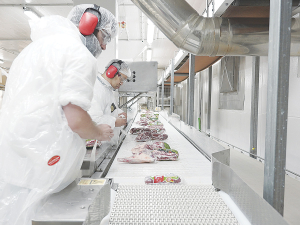Meat Industry Association CEO to Step Down
The Meat Industry Association of New Zealand (MIA) today announced that Chief Executive Officer Sirma Karapeeva has resigned from the role.
 The meat sector wants the new government to streamline the siloed approach to regulatory making by government departments.
The meat sector wants the new government to streamline the siloed approach to regulatory making by government departments.
A top priority for the incoming National-led coalition government is to sort out the ways regulations are formulated by various government agencies.
That's the view of the Meat Industry Association chief executive Sirma Karapeeva, who says there is a lack of a coordinated approach to deal with issues.
She told Rural News there seems to be a lack of consultation between government departments, which means that policy settings are disjointed and sometimes at odds with each other. Karapeeva believes this is just one of the systemic issues that causes grief to meat processors.
"The new government needs to have a good look at this issue and rationalise the silo approach to regulatory making."
Karapeeva's comments come as government departments - along with industry groups - are preparing briefing papers for the incoming government, known as BIMS, or briefings to the incoming minister.
These papers are compulsory for government departments, but other lobby organisations also take the opportunity to brief ministers and to state the issues they believe the government needs to address.
Karapeeva says the MIA will be seeking clarification around environmental matters such as He Waka Eke Noa (HWEN) and how the new government proposes to take this matter forward. She says farmers need certainty and practical, cost-effective solutions.
She adds that a big issue for the meat sector is around immigration matters. MIA has been raising concerns about this for a long time and Karapeeva says some of the same problems complained about are still not sorted.
"Some companies trying to apply to get in overseas workers but are finding the processing of visas is taking months. These delays make it impossible for companies to plan their season when they don't know how many people they will have working for them."
Another immigration-related issue of concern to MIA is having a 'fit for purpose' seasonal workers scheme - similar to the RSE arrangement that is available to the horticulture sector. Karapeeva says the meat industry was offered a scheme similar to the RSE before the election by the outgoing government.
"But the terms and conditions around that scheme do not fit the model of our industry," she says.
"I sense they did a cut and paste job with the horticulture RSE scheme and applied it to us. However, the hort RSE scheme only runs for seven months, but our processing industry runs for 12 months and what was offered simply does not meet the needs of our industry."
Karapeeva wants the incoming government to review what was offered and have a scheme tailored for the specific needs of the red meat sector.
New Zealand and Chile have signed a new arrangement designed to boost agricultural cooperation and drive sector success.
New DairyNZ research will help farmers mitigate the impacts of heat stress on herds in high-risk regions of the country.
Budou are being picked now in Bridge Pā, the most intense and exciting time of the year for the Greencollar team – and the harvest of the finest eating grapes is weeks earlier than expected.
The Real Estate Institute of New Zealand (REINZ) has released its latest rural property report, providing a detailed view of New Zealand’s rural real estate market for the 12 months ending December 2025.
Rural retailer Farmlands has released it's latest round of half-year results, labeling it as evidence that its five-year strategy is delivering on financial performance and better value for members.
OPINION: "We are back to where we were a year ago," according to a leading banking analyst in the UK, referring to US president Donald Trump's latest imposition of a global 10% tariff on all exports into the US.